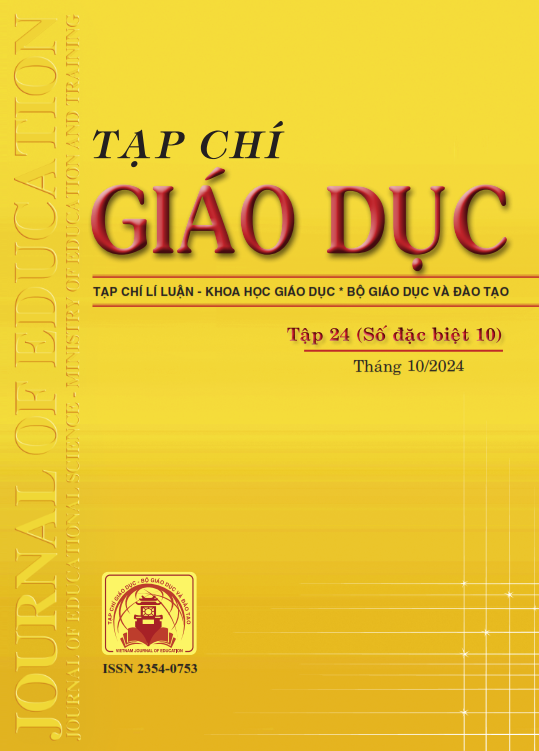Đánh giá tác động của ChatGPT đối với sự tự tin và thái độ tự học môn Toán tại nhà của học sinh lớp 9: Nghiên cứu trường hợp tại huyện Hóc Môn, Thành phố Hồ Chí Minh
Tóm tắt
In recent years, the rapid development of artificial intelligence (AI) has opened up many opportunities and challenges in the field of education. ChatGPT, an advanced AI system developed by OpenAI, has attracted considerable attention due to its potential application in education, especially in improving students' self-study methods. This study presents the impact of ChatGPT on the confidence and attitude towards learning Mathematics at home of 9th grade students at To Ky Secondary School, Hoc Mon District, Ho Chi Minh City. The survey was conducted on 60 9th grade students at To Ky Secondary School, Hoc Mon District, Ho Chi Minh City. The results showed that the use of ChatGPT significantly improved students' confidence and positive attitude towards self-studying Mathematics at home. Therefore, ChatGPT can be a useful tool in improving the quality of teaching, especially in learning Mathematics.
Tài liệu tham khảo
Bandura, A. (1997). Self-efficacy: The exercise of control. New York: W. H. Freeman.
Brown, T. B., Mann, B., Ryder, N., Subbiah, M., Kaplan, J., Prafulla Dhariwal, P.,…, & Amodei, D. (2020).
Language models are few-shot learners. Advances in Neural Information Processing Systems, 33, 1877-1901.
Deci, E. L., & Ryan, R. M. (1985). Intrinsic motivation and self-determination in human behavior. New York: Plenum.
Hartmann, J., Schwenzow, J., & Witte, M. (2023). The political ideology of conversational AI: Converging evidence on ChatGPT’s pro-environmental, left-libertarian orientation. Computation and Language.
Lê Anh Vinh, Bùi Thị Diển, Lê Quang Quân, Vũ Văn Luân (2023). Khả năng thực hiện bài kiểm tra định kì môn Toán và môn Ngữ văn cấp Trung học của công cụ ChatGPT: Kết quả nghiên cứu và một số khuyến nghị ban đầu. Tạp chí Khoa học Giáo dục Việt Nam, 19(2), 1-9.
Nguyễn Ngọc Giang, Phạm Huyền Trang, Nguyễn Thị Nga, Nguyễn Viết Dương, Nguyễn Tuấn Anh (2024). Sử dụng ChatGPT hỗ trợ dạy học giải các bài toán xác suất ở trung học cơ sở. Tạp chí Giáo dục, 24(số đặc biệt 1), 38-42.
Rasul, T., Nair, S., Kalendra, D., Robin, M., de Oliveira Santini, F., Ladeira, W. J., & Sun, M. (2023). The role of ChatGPT in higher education: Benefits, challenges, and future research directions. Journal of Applied Learning & Teaching, 6(1), 41-49. https://doi.org/10.37074/jalt.2023.6.1.29
Rudolph, J., Tan, S., & Tan, Sh. (2023). ChatGPT: Bullshit spewer or the end of traditional assessments in higher education?. Journal of Applied Learning & Teaching, 6(1), 1-22.
Wardat, Y., Tashtoush, M. A., AlAli, R., & Jarrah, A. M. (2023). ChatGPT: A revolutionary tool for teaching and learning mathematics. Eurasia Journal of Mathematics, Science and Technology Education, 19(7), https://doi.org/10.29333/ejmste/13272
Zimmerman, B. J. (2000). Attaining self-regulation: A social cognitive perspective. In M. Boekaerts, P. R. Pintrich, & M. Zeidner (Eds.). Handbook of self-regulation (pp. 13-39). Academic Press.
Đã Xuất bản
Cách trích dẫn
Số
Chuyên mục
Giấy phép

Tác phẩm này được cấp phép theo Ghi nhận tác giả của Creative Commons Giấy phép quốc tế 4.0 .












